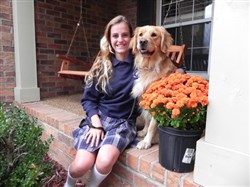 Home > Article
Home > Article
VOL. 36 | NO. 40 | Friday, October 5, 2012
Affordable training for lifesaving K9 companions
By Hollie Deese

Eva Leersnyder’s parents can sleep easier knowing 3-year-old golden retriever Melody is there to alert them if Eva experiences abnormal glucose levels.
-- Photo: Lyle Graves | Nashville LedgerParents of diabetic children face a daily fear many never have to worry about – whether their child will wake up safely each morning.
Low blood sugar can bring on hypoglycemia, which can cause the person to feel weak and tired, begin to sweat or have blurred vision before sending them into seizures and then, a coma. These symptoms are almost impossible to detect during a deep sleep and because of this, Lynne Leersnyder has not had a full night’s sleep since her daughter Eva, 13, was diagnosed with Type 1 diabetes at age 6.
“Either my husband or I check her before we go to bed, which is usually around 10 or 11, to make sure she is okay,” she says. “If she is low we will treat her right then. If the numbers are borderline, I won’t sleep well. So lots of nights I will set my alarm at 2 a.m. to check on her just for my peace of mind.”
The family, along with their 3-year-old dog Melody, recently went through a pilot training program that is a step toward claiming back some of that lost sleep.
Diabetic Alert Dogs: The Borderland Way, at Borderland Farms was held in Franklin. Developed by Borderland owner Ann Walling and veteran trainers Melanie Del Villaggio and Patty Wood, it teaches diabetics to train their dogs to detect abnormal glucose levels before they reach a dangerous levels.
“I knew a little bit about diabetic alert dogs and knew that most of them are trained in kennels by breeders and they are very, very expensive,” Walling says. “Most of them are well-trained excellent dogs who do a really good job. But they cost anywhere from $10,000-$30,000 each. And most people can’t pay that for a dog.”
She researched a training model that was being used in England and set out to develop a program here. The system is unique in that it allows diabetics to train dogs they already own rather than paying the high price for a pre-trained dog. Borderland works with owners to train their own dogs to identify and alert them during a hypoglycemic episode by identifying a distinctive scent found in the skin, sweat, saliva and breath.
Despite being a nurse when her daughter was diagnosed, Leersnyder, who has two other children with her husband, was totally overwhelmed at how dramatically their life changed post-diagnosis. “We had to instantly start adding up carbs for every single thing she put in her mouth, 24 hours a day, seven days a week, so it was a big adjustment for the whole family,” she says.
Walling understands her frustrations. Her own son, now 45, also has Type 1 diabetes, and she wishes she had known about this type of training program when he was growing up. “I always had dogs and if I had known how to train a dog to do scent work I would have,” she says. Now, she is helping him train his Corgi via Skype since he lives in Mexico.
“I have some understanding of the stress of living with someone who is a Type 1 diabetic,” Walling says. “It is really hard on the kids and families of kids, particularly at night. It is extremely dangerous and very stressful.”
Walling hopes the program, which just started its second round of ten-week sessions with another five families, offers an affordable tool to help monitor glucose levels.
“I have seen the really expensive dogs and how good they are and the good work they do,” Walling says. “It really creates a wonderful bond between the person and the dog.
And aside from the fact that the dog alerts them to low blood sugar, some of these people who have diabetes feel they are different. The dog really creates a bond, and it is kind of magical to watch how the dog provides psychological support other than alerting to diabetes. I would like to be able to make that available to people who can’t pay that kind of money for a dog.”
And while Lynne may not be sleeping through the night just yet, Eva and Melody have gotten closer because of the training and sleep together every night. “It is like having your best friend with you all the time,” Eva says.